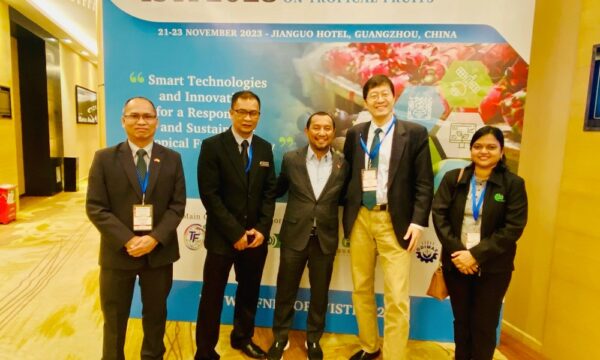
The UK is hosting the 26th UN Climate Change Conference of the Parties (COP26) in Glasgow from 31 October to 12 November 2021. This is the second in a series of four blogs by Jonathan Casey, Climate Change Manager at CABI, in support of CABI’s involvement at the event.
Key messages:
• Farmers need timely, accurate, and clear advice on how to manage pest risks
• Digitally-enabled early warning systems can help farmers adapt and minimize losses
• The complex interactions between pests, plants, and the environment under future climate change scenarios need further research to determine best practices
• Scaling digital climate information services will require a sharp focus on equity and inclusion
Pest and disease threats are increasing and spreading to new areas as climate change creates new niches for them to thrive and attack crops and livestock (FAO/IPPC, 2021). Climate change is also affecting pest management strategies, with more erratic rainfall, changing seasonal patterns, and weakening plant resistance to attack. Pest and disease risks can undermine climate adaptation and mitigation efforts, particularly by causing tree mortality, crop loss, and land degradation (IPPC, 2021).
Timely, accurate and clear advice
To cope with the dual threat of direct climate change impacts and increased pest and disease risks, farmers require timely, accurate, and clear advice on management strategies. This includes early warning of likely pest attacks, as well as when and how best to apply control products and methods, including biocontrol products and integrated pest management (Taylor, et al., 2021).
The Global Commission on Adaptation (GCA, 2021) has identified in its Investment Blueprint the critical role that digital climate information services can play in helping smallholder farmers to adapt to climate change impacts. CABI, through a range of initiatives and technologies, has been helping farmers minimize the effects of climate change and pest risks. Using CLIMEX modelling, CABI scientists provide important information to governments and to farmers to assess the risk of further invasion by pests and weeds, under present and future climate conditions.
End to end approach
The Pest Risk Information Service (PRISE) is a system pioneered by CABI and its partners Assimila and CEDA. It uses satellite earth observation data combined with climate change data and pest development models to provide tailored, accurate advice to farmers on when pest surges may occur, and clear advice on how and when to apply low-cost biopesticides to minimize crop damage. This comprehensive end-to-end approach ensures that information is received by those who need it most, when they need it most.
The ability to scale these approaches to wider regions and millions more smallholder farmers will require investment in the underlying digital data infrastructure, improved sensitivity and granularity of earth observation instruments, and the bundling of early warning systems with complementary services, including climate-smart agricultural advisory services, and affordable finance products (Casey, 2021). It will also require a sharp focus on equity: an individual’s ability to use and benefit from digital services is dependent upon their level of literacy and numeracy; their access to finance, land and labour; their power and control over the decision-making process; their confidence level; and their experience (Staub, Fara, Clarkson, & Casey, 2021).
Additional information
Main image: The Pest Risk Information Service (PRISE) puts vital information on pest risk mitigation into the hands of extension workers and smallholder farmers (Credit: CABI).
United Nations Climate Change Conference 2021 (COP26)
The COP26 summit is bringing parties together to accelerate action towards the goals of the Paris Agreement and the UN Framework Convention on Climate Change. Find out more from the website https://ukcop26.org/
Climate change and biodiversity
To find out more and discuss opportunities to work together please visit https://www.cabi.org/about-cabi/climate-change/ and/or email us: enquiries@cabi.org
Climate Change Briefings
This blog relates to the CABI Climate Change Briefing ‘Pest risk early warning systems in a changing climate.’
Three other briefings have also been published. These include ‘Invasive species management – a policy tool for integrated climate adaptation,’ as well as ‘Climate-smart pest management for nature-positive agriculture,’ and ‘Invasive species management: a nature-based solution for climate and environment.’
1 Comment
Leave a Reply
Related News & Blogs
Training delivered on early warning system using Earth Observation data to help manage crop pest pests in Kenya
CABI has teamed up with the Kenya Agricultural & Livestock Organization (KALRO) to deliver training aimed at helping smallholder maize, bean and tomato farmers understand important crop pest alerts derived from Earth Observation data. Experts in di…
30 April 2025





The blogs fits so well in the climate change global agenda. Pests like papaya mealybug is largely reported to increase as a result of climarical changes in coastal region and many other inland counties in Kenya